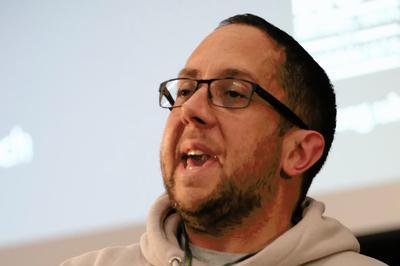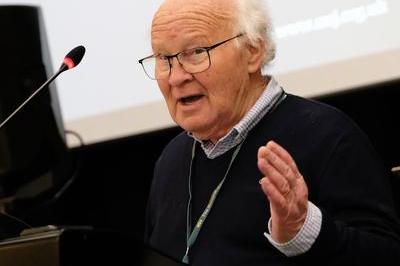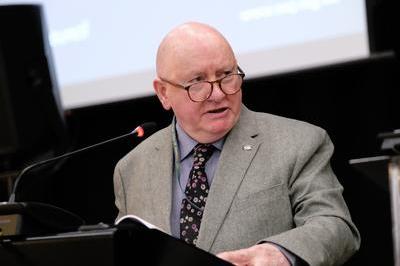DM2025: media freedom
The use of counter-terror legislation against journalists was condemned at DM. Motions on SLAPPs and on a campaign reforming the law, allowing the Investigatory Powers Tribunal to award costs were carried.
The NUJ has expressed its concern at the use of anti-terror legislation against journalists, in a position echoed too, by the International Federation of Journalists.
Delegates at this year’s DM heard of the use of counter-terror laws against journalists and the impact this has on their ability to carry out their reporting without fear. Pennie Quinton speaking in favour of composite B said anti-terror legislation was a “nightmare” for journalists. She raised concerns about the lack of safeguards for protecting sources.
Mariam Elsayeh Ibrahim said the use of anti-terrorism laws against journalists was “an outrage and should be condemned in the strongest possible terms.”
A second composite motion focused on sustainable funding for local reporting and public interest journalism. The NUJ’s News Recovery Plan proposes a bold set of measures to revive the industry: from windfall taxes on tech giants, to rates relief for local and public interest titles, and the establishment of a government-granted Journalism Foundation.
Matt Capon from the London Digital Media moved the composite motion, noting how titles such as Buzzfeed and Vice Media had “disappeared in a cloud of clicks." Capon encouraged the union to build on the News Recovery Plan and champion new models of public ownership, noting the progress made in Scotland and Wales.

Matt Capon
© Jess Hurd
Conrad Landin, speaking on behalf of the Scottish Executive Council, similarly described how “vulture corporations” destroy newsrooms and democracy. Landin said “the NUJ plays a vital role on the frontline defence on the war on local news”and called for the union to develop an ambitious strategy to preserve and expand newsrooms. David Nicholson, speaking on behalf of the NEC, accepted all instructions in the motions. Nicholson said that upcoming editions of The Journalist magazine will feature articles on media ownership and that the NEC will share successes across different executive councils, giving the example of public money being allocated to a dedicated reporter on the Welsh Parliament. The motion passed unanimously.
The chilling impact of Strategic Lawsuits Against Public Participation (SLAPPs) has long been campaigned against by the union. DM heard from speakers on the subject including David Gow on behalf of the NEC. He said intimidatory tactics were used as part of SLAPPs and that we needed to press UK and Irish governments to take action against the use of lawsuits that posed a threat to media freedom.

David Gow
© Jess Hurd
Speaking on behalf of the Ethics council, Simon Barrow noted that much damage takes place, as many journalists cannot afford to go to court and face the costs involved. Delegates passed the composite urging action to tackle SLAPPs.

Séamus Dooley.
© Jess Hurd
Séamus Dooley, NUJ assistant general secretary, proposed late notice motion 17 regarding the ruling of the Investigative Powers Tribunal (IPT), delivered on April 17th, 2025, that the Tribunal has no legal power to award costs against public bodies for delaying disclosure of key information.
Dooley said “in our dealings with the IPT there were a series of delaying tactics." He added that there had been no consequences for those who attempted to hide the full extent of their shocking and illegal behaviour.
Kevin Cooper, Belfast and District Branch said, “this is not just about police misusing the power of surveillance.” He noted it was MI5, MI6 too involved at some level.
DM carried the motion, calling on a campaign for urgent reform of the law to allow the IPT to award costs against statutory bodies who have wilfully withheld information and/or persistently breached Tribunal orders.
Nottingham Branch urged through its motion to instruct the NEC to organise a campaign highlighting the union's opposition to any future use of ‘non-disclosure’ briefings by the police. This arose from a decision by the Independent Press Standards Organisation (IPSO)not to uphold a complaint against the Nottingham Post by Nottinghamshire Police.
Ben Cooper, Nottingham, said, the motion relates to a tragic event. Local journalism fulfilled a vital democratic role when authorities had to confront an uncomfortable truth. The Nottingham Post refused to withhold the truth from the public about the killer. Chris Frost, NEC, said IPSO had validated the work of the Nottingham Post, that police attempted to shut down reporting, and the motion was important. The motion was carried.
The Irish Executive Council, through motion 84, raised concerns about the increasing tendency of the police in Northern Ireland and the Republic of Ireland to view photographers' and videographers' work as alternative sources of evidence gathering. Séamus Dooley, NUJ assistant general secretary moved the motion. Fran McNulty, incoming joint president seconded. He said journalists can be seen as ‘being in bed with the police’, and the motion is about those concerns. There was unanimous support for the motion.
Edinburgh Freelance Branch called on the NEC to support the introduction of positive reforms to Scotland's Freedom of Information regime. Joyce McMillan, Edinburgh Branch, backed the motion and congratulated the Freedom of Information Campaign Scotland on its 40th anniversary in 2024. Speaking in support David Gow, Edinburgh Freelance Branch, expressed concern that governments in England, Scotland, and Wales are holding out against systematic reform. The motion was carried.
On late motion nine, Yue He Parkinson, criticised cuts that President Trump had made to US Aid and media funding. Parkinson said that Voice of America and BBC were the only news services that gave her hope when she was a child in China in the face of a dominant Chinese State media service.
Owen Holdway, London Freelance Branch, said the cuts that Trump has implemented are detrimental; there needs to be a union-wide pushback against these cuts. The motion was carried.
